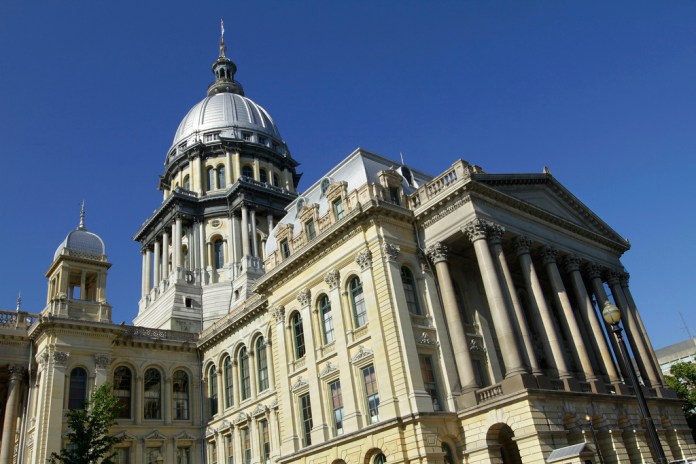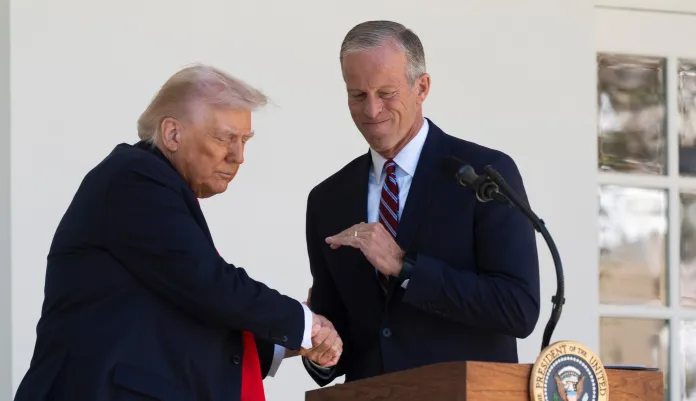Johnson plows ahead with doomed stopgap spending legislation – Washington Examiner
House Speaker Mike Johnson (R-LA) is proceeding with a vote on his government funding plan amidst rising dissent within his party that threatens its passage. Johnson’s proposal aims to maintain current spending levels until late March, contingent upon attaching the Republican SAVE Act, which necessitates proof of citizenship for voter registration. This stipulation, meant to satisfy hardline Republicans, has instead sparked opposition from members of his own party, with at least six already voicing their dissent and more indicating similar sentiments.
Despite these challenges, Johnson remains committed to bringing the legislation to the floor, asserting its importance. However, with limited Republican support available—he can only afford to lose four votes in a full attendance scenario—the success of the bill is uncertain. Even if it passes the House, the proposal’s chances in the Democratic-controlled Senate remain slim, with predictions suggesting it might lead to a basic funding extension without additional policy provisions.
The current intra-party conflicts echo previous struggles faced during similar budget discussions, recalling last year’s difficulties experienced by former Speaker Kevin McCarthy when he attempted to balance demands from the party’s right faction. As the vote approaches, Johnson has not revealed any backup plans in case the funding proposal fails.
Deja vu and no Plan B: Johnson plows ahead with doomed stopgap spending deal
House Speaker Mike Johnson (R-LA) will move forward with a vote on his government funding plan despite growing opposition within his own party that could kill the bill when it reaches the floor this week.
Johnson unveiled his plan to fund the government last week, proposing to extend current spending levels until late March but only if lawmakers attach the Republicans’ SAVE Act that would require proof of citizenship for voter registration. Although that caveat was made to appease some of his most hardline members, the proposal has been met with opposition from those very same Republicans — putting its future in peril.
2024 PRESIDENTIAL DEBATE LIVE UPDATES: TRUMP AND HARRIS FACE OFF IN ABC SHOWDOWN
At least six House Republicans have come out against the continuing resolution, with a handful of others hinting they’d do the same. With Johnson’s slim majority, he can only afford to lose four GOP votes if there is full attendance and all Democrats vote against it.
Nonetheless, Johnson has remained adamant he would bring the legislation to the floor for a vote, backing the proposal in a closed-door meeting with GOP lawmakers on Tuesday.
“I am in this to win this,” Johnson told reporters. “I think it’s something we must do. That’s why it’s worth fighting for. I’m not going to engage in conjecture and try to game out all the outcomes. I think this is something that we should do, and that’s what we’re doing.”
Lawmakers are scheduled to vote on the continuing resolution on Wednesday, although it’s not clear how GOP leaders will proceed if the bill fails on the floor. Johnson has not indicated any sort of backup plan, and one House Republican said there have been no discussions of next steps.
Even if the continuing resolution did make it through the House, the SAVE Act is likely dead on arrival in the Democratic-led Senate. In fact, some Republicans predict sending a CR-SAVE Act combination to the upper chamber would only result in the return of a clean extension of funding levels without any policy riders.
That possibility, some lawmakers said, is why they won’t vote for the legislation.
“I refuse to be a thespian in the Speaker’s failure theater,” Rep. Thomas Massie (R-KY), one of the first Republicans to come out against the plan, said in a post on X. “The 6 month continuing resolution with the SAVE Act attached is an insult to Americans’ intelligence. The CR doesn’t cut spending, and the shiny object attached to it will be dropped like a hot potato before passage.”
The intraparty fighting and dragged-out spending negotiations bring a bout of deja vu to those on Capitol Hill. It’s reminiscent of this time last year when then-Speaker Kevin McCarthy sought to appease the right flank of his party while also trying to squeeze through a temporary spending agreement to keep the government open.
At the time, McCarthy proposed attaching Republicans’ signature border bill, H.R. 2, to a continuing resolution as a way to buy more time for spending negotiations while also notching a GOP policy win. However, similar to Johnson’s fate, a number of House Republicans opposed that proposal, causing it to fail when it was brought to the floor for a vote.
McCarthy then made a deal with House Democrats to pass a continuing resolution just hours before the government shutdown deadline, a move that ultimately resulted in his ouster as speaker.
Although Johnson may not experience that same fate — no House Republican is calling for his removal from the top leadership position — many lawmakers have said they feel as if they are reliving history.
“All over again,” one lawmaker told the Washington Examiner.
Democrats have criticized Republicans for the repeated history, lamenting that GOP leaders are pushing forward a “partisan and extreme continuing resolution” that likely can’t survive their own conference.
“Extreme Republicans know that this bill has no chance of becoming law, and yet they want to force a vote that jeopardizes military readiness and veterans healthcare,” House Democratic Caucus Chairman Pete Aguilar (D-CA) said. “We’ve seen how this ends.”
“It feels like Groundhog Day all over again,” Democratic Caucus Vice Chairman Ted Lieu (D-CA) added, referring to the 1993 film in which the protagonist finds himself reliving the same day over and over again.
" Conservative News Daily does not always share or support the views and opinions expressed here; they are just those of the writer."




